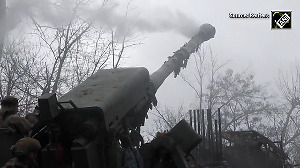The provision in the new mining bill approved by a group of ministers last week for 26 per cent profit sharing by mining companies with affected residents of the area they operate in hasn't been welcomed by many in the sector.
The new bill, in general, seeks to expedite the grant of mining rights in a transparent manner, aiming to attract more investments in the sector from industries such as steel.
India's top three mining companies -- Coal India, NMDC and Sesa Goa -- will add Rs 3,600 crore to the District Development Fund if the 26 per cent profit sharing proposal with local residents goes through. That's almost half the disinvestment proceeds from the REC, NHPC and OIL India follow-on offers in 2009-10.
The proposal has already sparked stiff opposition. It's not often that a public sector company speaks out against a government proposal, but Steel Authority of India Ltd chairman, C S Verma, was the first to voice scepticism on the profit sharing proposal. Since then, many others have.
The proposal has caused a flutter in the metals and mining circuit. The industry's take is simple: It's noble, but impractical.
"The proposal is aimed at mitigating problems with land acquisition. But why should a land loser in the mineral-rich area get so much more than agricultural land losers? Mineral-rich areas have scanty population, so a lot of wealth will be distributed among a few. It will completely distort factor pricing," said a public sector mining executive.
The average population in mineral-rich Jharkhand is 20-25 people for about 600 hectares. "It will just breed inequity in the system," he added.
Moreover, some of the best mines in the country such as Bailadila are under the forest department. NMDC's Bailadila deposits, with one of the highest iron content, produce about 22 million tonnes. "Does it mean we should stop the corporate social responsibility work that we normally do in the Bastar region?" asked an NMDC official.
Coal India Chairman Partha S Bhattacharyya, however, expressed support for the proposal. "It is an effort to promote distributive justice. In principle, we fully agree with the empowerment of people affected by mining projects," he said.
Officials, on condition of anonymity, said implementation of this plan would put pressure on Coal India, which sells the fuel at government-regulated prices, lower than the market norm. "If the proposal is implemented, we may have to increase the price of coal, which will have an impact on the cost of electricity and other user industries. The government should keep this in mind," the officials said. "It is important to recognise that coal mining is closely associated with the energy security of this country."
Money handling
The deployment mechanics is also under suspicion. "We spend around Rs 100 crore on an annual basis on corporate social responsibility. How will the funds be used? The BEE in South Africa (Black Economic Empowerment programme, on which this plan is supposed to be based) hasn't worked. Few people have got value out of it," says Tata Steel's group chief financial officer, Koushik Chatterjee.
Bhattacharyya says corporate social responsibility, which is undertaken by mining companies, can't always be monetised. "Skill development for making people employable is also a cost. By that logic, maybe some companies already spend a considerable amount towards the local population," he said.
The royalty paid by the companies, which is meant to be used for development of the region, goes to the Consolidated Fund of India. The obvious question is, if the scheme has failed to iron out development-related problems, why should the outcome of the District Development Fund be any different?
The amount that companies would have to shell out is staggering, but that is just one of the many problems. For metal companies, the accounting is likely to be complicated. "How will it be done? What will be the transfer pricing?" asked Sterlite's finance director, Tarun Jain.








 © 2025
© 2025